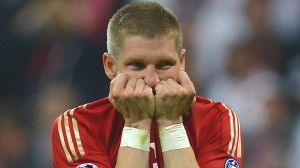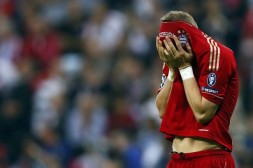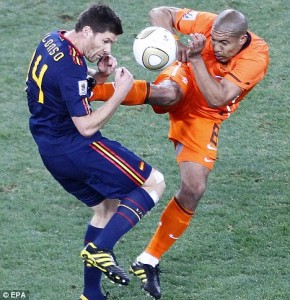Yes, it's been weeks, but I wasn't going to not comment on the Barcelona-Bayern 2nd leg. There was just too much that was interesting about it.
1. Arjen Robben's goal in the 49th minute.
(Watch a weirdly letterboxed version here or the clips below, which sadly both start close to when Robben received the ball, and so don't clearly show Alaba's pass.)
[Technical difficulties are preventing the upload of those clips for now. I hope to have this squared away soon.]
First of all, consider just what an amazing pass David Alaba actually made: from the left touchline, just inside Bayern's defensive half, diagonally across the field and in behind the defense. Alaba turns 21 on June 24th. On that day, hoist a beer for the best left back in the world. He's that good.
What I found especially interesting about the goal, beside that it was awesome, was Ian Wright's commentary about it. He kept repeating just how bad Adriano's defense was on the play. But I didn't really agree, and still don't. I've watched the clip many times. The flaw Bayern exploited wasn't simply Adriano's, and the solution to it isn't simple.
First of all, let's do away with the notion that Adriano had simply made a mistake by letting Robben get onto his left foot. Watch Adriano's position as he moves to close Robben down. Robben is closer to the endline than Adriano is and is moving directly toward goal. It's not like Adriano simply forgot that Robben likes to pull the ball back inside and shoot the exact left-footed curler he did here. Adriano simply has to close Robben quickly. If he overplays Robben to prevent Robben's inside run, then Robben continues at pace directly toward goal with the defense completely behind the play. Adriano can neither allow that to happen nor allow a simple right-footed cross across the six-yard box, which even the profoundly one-footed Robben is capable of.
Robben knows that Adriano has to close him down quickly, cutting off the direct route to goal, and so uses that fact against him: he waits until Adriano has nearly regained proper positioning but is still moving at pace, and then switches to the inside run, at which point Adriano's momentum carries him out of position. Note also that Robben is moving away from the goal as he does this. If the problem is simply Adriano's defense, what would you suggest he do better?
The answer, for what it's worth, is that Adriano initially needs to be closer to Robben as Robben receives the ball, in order to be able to set himself into a proper defensive position with his balance properly squared. But this solution comes with its own problems. A change in Adriano's positioning demands shifts in Barcelona's entire defense. For example, if Adriano plays closer to the endline, preventing a pass like Alaba's from going in behind him, then the entire defense has to play that much deeper. But a deeper back line gives Bayern's dangerous midfield more room to work. Alternately, Adriano could play more out to Robben's side of the field, but then the backline has to stretch their positioning to fill the space as best as possible. However, this creates larger channels for the offense to attack into. And let's say again where the Alaba was when he sent his pass to Robben: against the left touchline, just inside his own half. I propose that if you position your defense to prevent a 60-yard crossfield diagonal pass from the left back, you are creating untenable tactical problems for your defense.
What I'm getting at is that, given Barcelona's approach to defense, the play was nearly indefensible. Barcelona's defense is predicated on high pressure and a high backline, so as to squeeze the space the attacking team has to work in. Against that kind of position, the combination we saw on the play--an astonishingly accurate diagonal ball from midfield in behind the defense, being run onto by a very fast player who is a danger both to break toward goal or to pull the ball inside--created a situation that Barcelona was always going to struggle to handle. In many ways, their best bet was to hope Robben simply wasted his shot, which he has done throughout his career with substantial frequency.
(Against a defense that doesn't play an offside trap and instead tries to get both it's defenders and midfield behind the ball, the situation is totally different. Then Robben can be easily doubleteamed in this sort of situation. But that's not how Barcelona play.)
2. How little Barcelona actually troubled Bayern's defense. On some level, I can hardly believe I just wrote that. Barcelona not troubling a defense? Is that even possible?
What it points to is that Barcelona currently have a big hole in their squad. As long as Messi was on the field and fit, it was possible to ignore the problem. After all, Barça have run away with La Liga this year, so far scoring an astonishing 109 goals in 36 games. Of those 109, Messi has 46 (and another eight in the Champions League)--over 42% of Barcelona's total goals. With that kind of success, you might not worry that your next-highest scorer (Fabregas) has only ten in the league.
But once the obvious 42% of their scoring disappeared--and make no mistake, he was absent in the first leg as well, notwithstanding being on the pitch--it became clear just how much of the remaining 58% Messi also accounts for. Go back and watch his goals against AC Milan in the return leg at the Camp Nou. In both cases, how does he find the space to get the shot away? The only answer that makes sense is that Messi films the world at a higher frame rate than we do--than anyone does--and when his brain processes that visual information down to a standard 24-frames-a-second, everything happens in super-slow-motion. Holes that none of the rest of us ever see appear obvious to him.
That means he can score even when you collapse an extra defender or two or three against him. We've all see him do it, and it's amazing. But the other thing he can do, once he's pulled two or three or four defenders over to him, is to pass the ball on to a teammate, who finds himself terribly open and basically unable to not score.
Without Messi on the pitch, what was there to move Bayern's defense around and create opportunities for the rest of the team? The 7-0 aggregate scoreline gives you all the answer you need.
There's nothing particularly insightful about saying, "Take the best player in the world away from his team and notice that they aren't nearly as good." It's true, there's no replacing Messi. But there was an interesting tell in Bayern's defensive positioning that might point to what Barcelona is lacking. I kept noticing that when Barça were in possession, Bayern's back four were sitting comfortably ten or fifteen yards--sometimes more--in front of their own penalty box. Barcelona's obsessive possession-based attacking style is all about relentless probing the defense, looking for exploitable pockets of space. But here Bayern were dictating the space Barça had to work in.
Now, you only do this kind of defensive tactic at the professional level if you are comfortable that your defense is fast enough to recover when a ball is played in behind them; clearly this was true of Bayern on the day. As I watched, it became more and more clear not that Barça were missing Messi, which is obvious, since he's irreplaceable, but that they were missing pace in general. Villa and Fabregas and Alexis Sanchez are all gifted goal scorers, but how many of them remind you of Samuel Eto'o in his prime? How many terrify a defense with their blazing speed?
And what strikes me as especially interesting about this observation is that you don't need a particularly amazing player to make it work. Find someone who is really really fast and is capable of scoring when he gets one-on-one against the keeper. He can essentially be completely one-dimensional. As soon as you have this type of player, the defense has to position themselves deeper to keep him from getting behind them. Moving the defense backward creates space for the rest of the team, and that's all Barcelona need to win games. Xavi and Iniesta may be past their peaks--we'll see--but they are still capable of scoring and creating goals when they get the space they need.
3. How good Pique was. It's a minor point, given how things turned out, but as I wrote in my notes after Pique broke up a Bayern 4-on-3 in the 25th minute: He's single-handedly kept Barça in this so far."
Keep in mind also that his girlfriend is Shakira.
4. This was a passing of the torch. Or perhaps not. I'm reluctant to read too much into it. Yeah, Bayern dominated over the two legs. But would you say unequivocally that Barça end up dominated if they're able to field a fully fit Lionel Messi? It's true that an overreliance on a single player is a weakness, but one that says Barcelona's days in the sun are over? I think not.
Next season will be very interesting indeed.


